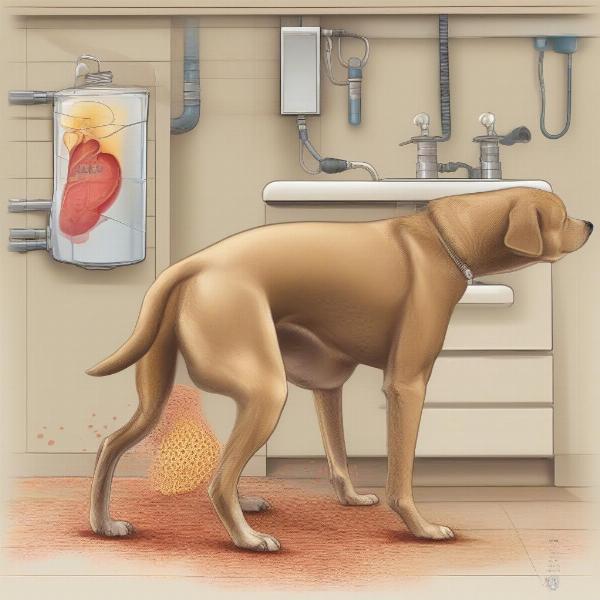After surgery, it’s common for dogs to experience changes in their urinary habits. While some changes are normal, a dog not urinating after surgery can be a serious sign of complications and requires immediate veterinary attention. This article will delve into the potential causes, when to worry, and what steps to take if your dog isn’t urinating post-operatively.
Understanding Post-Operative Urinary Retention in Dogs
Many factors can contribute to a dog’s inability to urinate after surgery, ranging from pain and medication side effects to more serious complications like bladder blockages. It’s crucial to understand these potential issues to ensure your furry friend receives the appropriate care.
Pain and Discomfort
Pain and discomfort associated with the surgery can make it difficult for your dog to urinate. The act of urinating may exacerbate their pain, causing them to avoid it. Additionally, some surgical procedures, especially those involving the urinary tract or abdomen, can directly affect bladder function.
Medication Side Effects
Certain medications used during and after surgery, like pain relievers and anesthetics, can temporarily affect bladder control. These drugs can sometimes cause urinary retention as a side effect.
Bladder Blockages
 Hình minh họa tắc nghẽn bàng quang ở chó
Hình minh họa tắc nghẽn bàng quang ở chó
Blockages in the bladder, such as bladder stones or tumors, can physically prevent urine from being expelled. While these issues may exist prior to surgery, the stress and physiological changes associated with surgery can sometimes exacerbate them.
Urinary Tract Infections (UTIs)
UTIs can cause inflammation and pain in the urinary tract, making urination difficult. While not directly caused by surgery, a weakened immune system post-operatively can make dogs more susceptible to infections, including UTIs.
When to Seek Veterinary Attention
Any instance of your dog not urinating within 12-24 hours after surgery warrants immediate veterinary attention. This is a serious issue that can quickly escalate and cause further complications. Other signs to watch out for include straining to urinate, frequent unsuccessful attempts to urinate, whimpering or crying during urination, and blood in the urine.
Diagnosing the Cause of Urinary Retention
Your veterinarian will likely perform a physical examination and may recommend further diagnostic tests, such as blood work, urinalysis, dog abdomen x ray, and ultrasound, to determine the underlying cause of the urinary retention.
Treatment Options for Post-Operative Urinary Retention
Treatment for urinary retention will depend on the underlying cause. Your veterinarian may recommend:
- Pain management: Addressing pain and discomfort can often alleviate urinary retention.
- Medication adjustments: Changing medications or dosages can minimize side effects impacting bladder function.
- Catheterization: Inserting a dog catheter can help drain the bladder and provide immediate relief.
- Fluid therapy: Intravenous fluids can help flush the urinary tract and promote urination.
- Surgery: In cases of bladder blockages, surgical intervention may be necessary.
Home Care and Prevention
Once your dog is home, follow your veterinarian’s instructions carefully. Ensure your dog has easy access to fresh water and encourage them to urinate frequently. Monitor their urine output and report any abnormalities to your vet. While not all cases of post-operative urinary retention are preventable, ensuring your dog is well-hydrated before surgery and discussing potential medication side effects with your veterinarian can help minimize the risk.
Conclusion
A dog not urinating after surgery is a serious matter requiring immediate veterinary attention. Understanding the potential causes, recognizing the warning signs, and seeking prompt treatment can help prevent further complications and ensure your furry friend recovers quickly and comfortably. pros and cons of desexing male dogs Don’t hesitate to contact your veterinarian if you have any concerns about your dog’s urinary habits after surgery.
FAQ
-
How long after surgery is it normal for a dog not to urinate? It’s generally concerning if a dog hasn’t urinated within 12-24 hours after surgery.
-
What are the signs of a UTI in dogs? Frequent urination, straining to urinate, blood in the urine, and accidents in the house are common signs of a UTI.
-
Can stress cause urinary retention in dogs? Yes, stress can sometimes contribute to urinary retention, especially in already anxious dogs.
-
How can I encourage my dog to urinate after surgery? Provide easy access to fresh water, take them for frequent short walks, and create a calm and comfortable environment.
-
What are the long-term effects of urinary retention in dogs? Untreated urinary retention can lead to bladder infections, kidney damage, and even rupture of the bladder.
ILM Dog is a leading online resource dedicated to providing dog owners with expert advice and information on all aspects of dog care. From breed selection and health to training, nutrition, and grooming, we strive to empower owners with the knowledge they need to provide the best possible care for their canine companions. dog anus gland removal recovery Whether you’re a seasoned dog owner or just starting out, ILM Dog offers valuable resources to help you navigate every stage of your dog’s life. Contact us at [email protected] or +44 20-3965-8624 for expert advice and guidance.